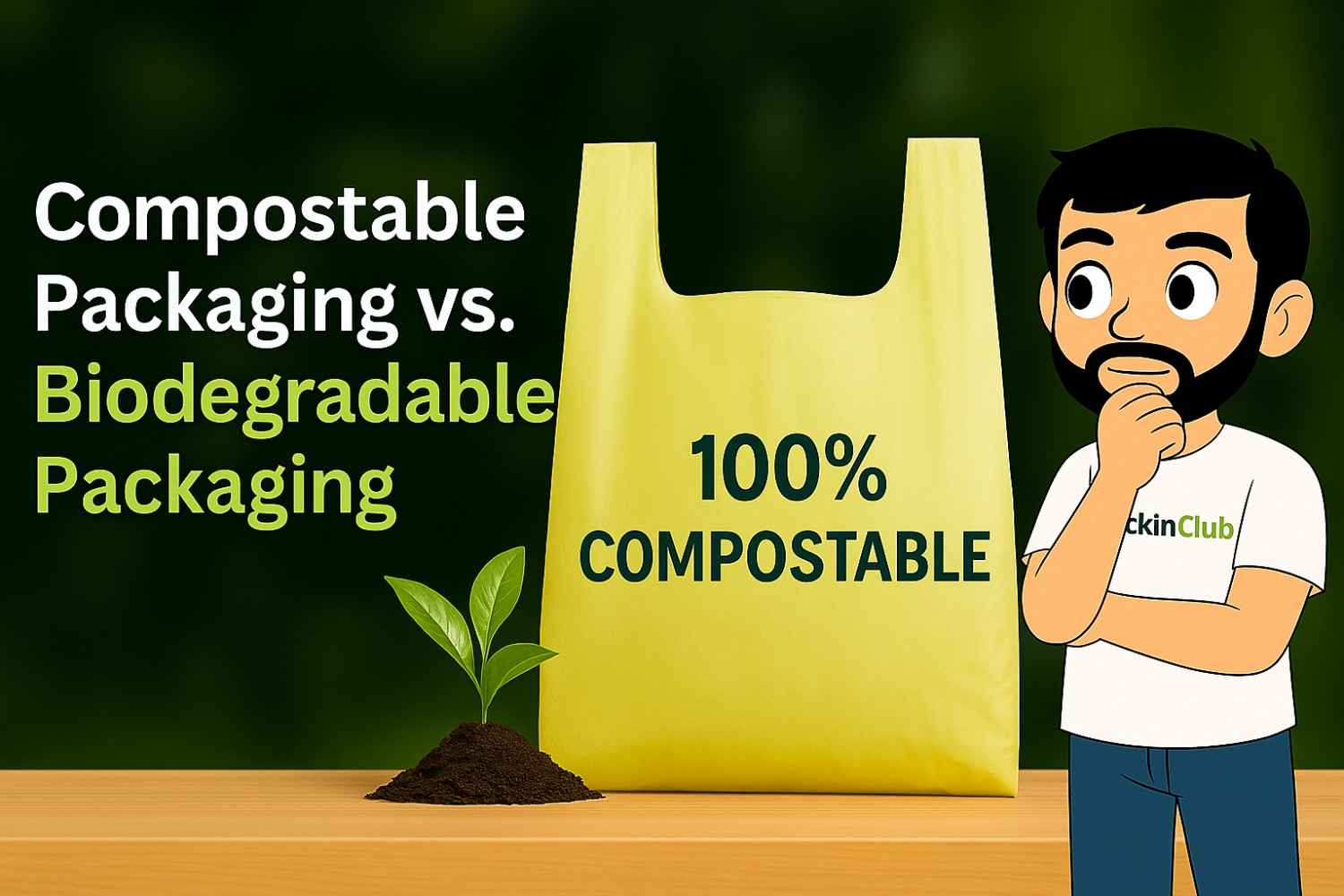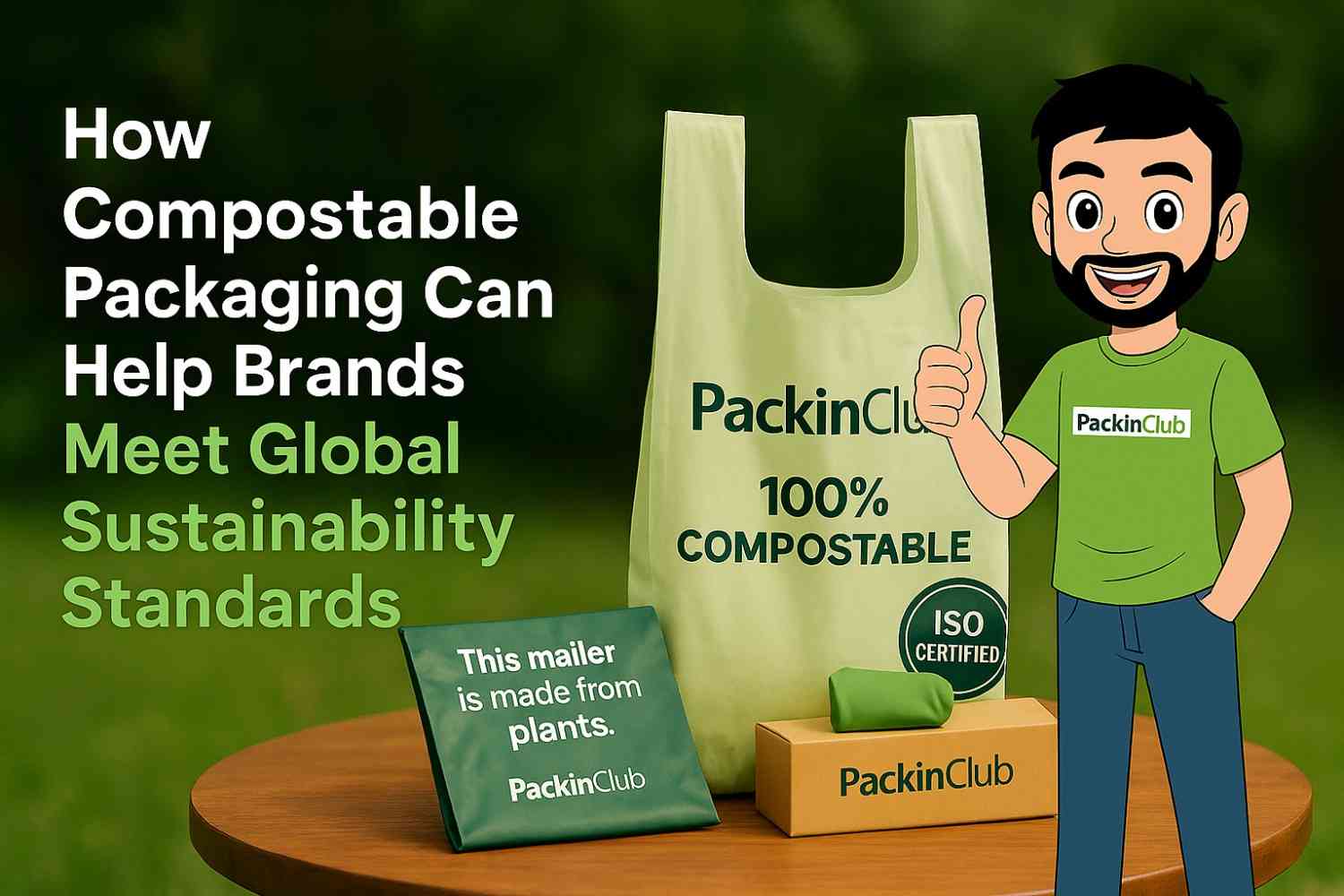Businesses in India are increasingly adopting eco-friendly packaging to meet customer expectations and sustainability goals. However, terms like “compostable” and “biodegradable” are often misunderstood. While both seem eco-friendly, they are quite different.
In this blog, we’ll simplify these differences and explain why compostable packaging is the smarter choice for Indian brands.
Compostable vs. Biodegradable Packaging – Key Differences
| Feature | Compostable Packaging | Biodegradable Packaging |
| Material Source | Made from plant-based materials like cornstarch, sugarcane, or bamboo. | Often petroleum-based with chemical additives. |
| Decomposition Time | Breaks down in 3-6 months in composting environments. | Can take years or even decades. |
| Residue Left Behind | Leaves zero toxic residue; fully eco-friendly. | May leave harmful microplastic particles. |
| Environmental Impact | Actively supports soil enrichment by turning into natural biomass. | Can pollute land and water bodies. |
| Certifications | CPCB, CIPET, ISO 17088 certified for safety and sustainability. | Often lacks robust certification standards. |
What is Biodegradable Packaging?
Biodegradable packaging refers to materials that break down naturally. However, this process can take years or even decades.
Many biodegradable products are still made from petroleum-based plastics with chemical additives, making them less eco-friendly than they appear. These products can leave behind microplastic residues, harming the environment.
What is Compostable Packaging?
Compostable packaging is made from plant-based materials like cornstarch, sugarcane, or bamboo. It breaks down quickly into natural elements like carbon dioxide, water, and biomass — leaving no toxic residue.
In controlled composting environments, compostable packaging can degrade in 3-6 months, making it a far superior choice for the environment.
Learn how Packin Club’s compostable solutions reduce waste effectively.
Why Compostable Packaging is Better for Indian Brands
1. Faster Decomposition
Compostable packaging decomposes in months, while biodegradable products may take years to break down. This faster breakdown reduces landfill waste.
2. Zero Toxic Residue
Unlike biodegradable plastics that may leave microplastic particles behind, compostable packaging breaks down completely with no harmful by-products.
3. Compliant with Sustainability Standards
Compostable packaging aligns better with Indian and global eco-regulations, including:
- CPCB Certification (Central Pollution Control Board)
- CIPET Testing for Biodegradability
- ISO 17088 Compostability Standards
Explore Packin Club’s certified compostable options.
4. Ideal for Food, E-commerce, and Retail
Compostable packaging is safe for food, beverages, and other consumer products. It’s becoming increasingly popular in cafes, grocery stores, and restaurants.
See Packin Club’s industry-specific solutions.
Conclusion
While biodegradable packaging may seem eco-friendly, it often lingers in the environment for years. Compostable packaging offers a faster, cleaner, and safer solution for businesses aiming to reduce their carbon footprint.
Ready to switch to smarter packaging?
Contact Packin Club today and explore eco-friendly solutions for your brand.
Frequently Asked Questions (FAQs)
1. Why is compostable packaging better than biodegradable packaging?
Compostable packaging decomposes faster and leaves no toxic residue. Biodegradable packaging can take years to break down and may still release harmful microplastics.
2. Can compostable packaging handle food and liquid products?
Yes! With advanced moisture-resistant coatings, compostable packaging is perfect for storing food, beverages, and more.
3. Does compostable packaging need special disposal methods?
While compostable products break down faster in industrial composting facilities, they can still degrade in natural compost piles.
4. Are compostable materials safe for the environment?
Absolutely. Compostable packaging is designed to return safely to the earth, leaving no harmful residues.
5. How can I identify genuine compostable packaging?
Look for trusted certifications like CPCB, CIPET, and ISO 17088 to ensure authenticity.





